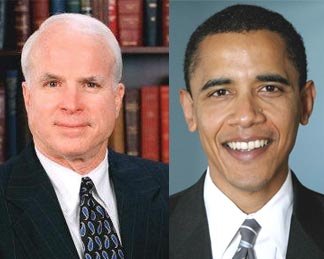Asia likes McCain's free trade, Obama's diplomacy
 Bangkok One thing is for sure: the next US president will come to the White House with some first-hand experiences in Asia.
Bangkok One thing is for sure: the next US president will come to the White House with some first-hand experiences in Asia.
Republican John McCain, 72, a decorated war hero, was shot down on a bombing mission in 1967 over North Vietnam, captured and tortured in the notorious "Hanoi Hilton," where he was kept as a prisoner of war until 1973.
Democrat Barack Obama, 47, spent part of his peripatetic youth in Indonesia, where he attended a public Muslim school - not a Madrassah as some of his critics have alleged - in Jakarta between 1969-71.
Different Asian experiences indeed.
"Scholars tend to see Obama's Asian experience as more relevant to today's problems," said Surat Horachaikul, an expert on international relations at Chulalongkorn University.
"At least, under Obama the war on (terrorism) will be revoked and other methods will be used to deal with terrorism. Islam needs to open up and they don't see Republicanism ideas as able to solve these problems," added Surat, citing his fellow scholars in Muslim Indonesia and Malaysia.
Of course, the next president of the US will be judged in Asia by the performance of outgoing President George W Bush.
While Bush's domestic legacy may be a bitter one, battered by the sub-prime mortgage crisis, financial meltdown and looming recession, in Asia, his administration's performance has left good impressions in some places.
For instance, both Bush and wife Laura were staunch supporters of the pro-democracy struggle led by Aung San Suu Kyi in military-run Myanmar, still called Burma by some.
That policy is unlikely to change no matter who becomes US president.
"Burma is a rare bipartisan issue in US politics," said Aung Din, executive director of the US Campaign for Burma.
"Both Republican and Democrat agree on strong US policy on Burma, which include imposing strong economic sanctions against the junta; increasing strong diplomatic pressure on China, India and ASEAN to work together with the US on Burma; and pushing the UN Security Council to take effective action on Burma," he added, noting that both McCain and Obama were the major sponsors of the past three Senate resolutions against the junta.
Nor are dramatic changes expected in Sino-US ties.
China, although still riled by the recent arms sale to Taiwan, is relatively satisfied with their US relations, and convinced that neither candidate will alter those relations much.
"Although the two candidates might be a little bit different - Obama might take a protectionist policy on trade. McCain is really tough on security issues - we see that both of them claimed they would like to maintain the sound development of Sino-US relations," said Shi Yinhong, an international relations expert at Peoples University in Beijing.
Given the serious US economic woes, the next president is likely to be keen to keep on Beijing's good side, and downplay such issues as human rights, he said.
"Any US president can hardly expect a more and more confident China to accept ... criticism from the US," said Shi.
More interesting will be the next president's approach to India, where Bush can claim considerable achievements.
US-India relations saw an unprecedented transformation during the Bush administration, removing years of Cold War bitterness and leaving ties between the world's largest democracies at an all-time high.
Both the Bush administration and the Singh government count the recently signed bilateral civilian nuclear agreement as a significant foreign policy achievement during their tenures.
While McCain is expected to broadly continue the Bush administration's policies and foster a special and close relationship with India, Obama's ascent is viewed more circumspectly, particularly because of his views on economic issues, including his criticism of outsourcing of jobs to India as well as his earlier attempt to block the civilian nuclear deal.
"An Obama administration could have more emphasis on non- proliferation objectives, which could make the bilateral nuclear deal run into rough weather," said one Indian foreign ministry official who asked to remain anonymous.
"But we are certain that he or anyone else will not be hostile to India. This is because the US-India relationship now has a dynamic of its own," he added.
And then there is the economy, one Bush legacy which most nations would seem to want to leave behind.
Much of the world has blamed Bush and his deregulation policies for bringing the world to the brink of the worst financial crisis since 1929, and the financial crisis has delivered new support for Obama at home.
But although Asian markets have suffered, Asian governments are more worried about free trade and what a Democratic president like Obama could mean for globalization.
"McCain is for an open economy, has no problems with outsourcing and free trade," said retired Major General Deepankar Bannerjee, director of Institute of Peace and Conflict Studies, a New Delhi- based strategic think tank.
"Barack Obama on the other hand has said he would prevent outsourcing jobs and protect the US economy through restrictive practices that may not be helpful for India's economy," he added, while noting that even so, Obama is certainly the more popular candidate among the Indian masses.
"Obama would largely be positive for the world and India," said Cherian Samuel of the Institute of Defence Studies and Analyses, another Delhi-based strategic think tank. (dpa)